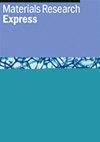Mechanical and microstructural characterization of sustainable concrete containing recycled concrete and waste rubber tire fiber
IF 2.2
4区 材料科学
Q3 MATERIALS SCIENCE, MULTIDISCIPLINARY
引用次数: 0
Abstract
The production of cement, which is the key ingredient of concrete, leads to environmental pollution by releasing massive amounts of CO2 and using significant natural resources. Therefore, shifting towards sustainable and greener materials is essential for mitigating these challenges. In this study, recycled concrete powder (RCP) was used as a cement replacement (0%, 5.0%, 10%, and 15%), solving the waste dumps issue and promoting sustainability. Furthermore, the concrete is also reinforced with steel fibers which were obtained from waste rubber tires to improve concrete tensile strength. The concrete properties were evaluated through slump cone test, compressive strength, failure patterns, tensile strength, scanning electronic microscopy, and FTIR analysis. The results indicate that the concrete strength properties improved with the substitution of RCP. The compressive and tensile strength of the optimum mix (10% RCP and 2.0% addition of steel fibers) are 15.8% and 23% more than those of reference concrete. However, the concrete flow is adversely impacted due to RCP angular particle shapes. Failure patterns indicate that RCP and steel fibers improved concrete ductility. SEM and FTIR analysis indicate microstructural improvement with RCP and steel fibers. Finally, the analysis concluded that the developed concrete showed better performance, solved waste dumps issues, and promoted sustainability.含有再生混凝土和废旧橡胶轮胎纤维的可持续混凝土的力学和微结构表征
水泥是混凝土的主要成分,其生产过程会释放大量二氧化碳并消耗大量自然资源,从而导致环境污染。因此,转向使用可持续的绿色材料对于缓解这些挑战至关重要。在这项研究中,使用了再生混凝土粉(RCP)作为水泥替代物(0%、5.0%、10% 和 15%),从而解决了垃圾堆放问题,促进了可持续发展。此外,还使用从废旧橡胶轮胎中提取的钢纤维对混凝土进行加固,以提高混凝土的抗拉强度。通过坍落度锥试验、抗压强度、破坏形态、拉伸强度、扫描电子显微镜和傅立叶变换红外分析,对混凝土性能进行了评估。结果表明,添加 RCP 后,混凝土的强度性能得到了改善。最佳混合料(10% 的 RCP 和 2.0% 的钢纤维添加量)的抗压强度和抗拉强度分别比参考混凝土高出 15.8% 和 23%。然而,由于 RCP 的角状颗粒形状,混凝土的流动性受到了不利影响。破坏形态表明 RCP 和钢纤维改善了混凝土的延展性。扫描电镜和傅立叶变换红外分析表明,RCP 和钢纤维改善了微观结构。最后,分析得出结论,开发的混凝土性能更好,解决了废物倾倒问题,促进了可持续发展。
本文章由计算机程序翻译,如有差异,请以英文原文为准。
求助全文
约1分钟内获得全文
求助全文
来源期刊

Materials Research Express
MATERIALS SCIENCE, MULTIDISCIPLINARY-
CiteScore
4.50
自引率
4.30%
发文量
640
审稿时长
12 weeks
期刊介绍:
A broad, rapid peer-review journal publishing new experimental and theoretical research on the design, fabrication, properties and applications of all classes of materials.
 求助内容:
求助内容: 应助结果提醒方式:
应助结果提醒方式:


